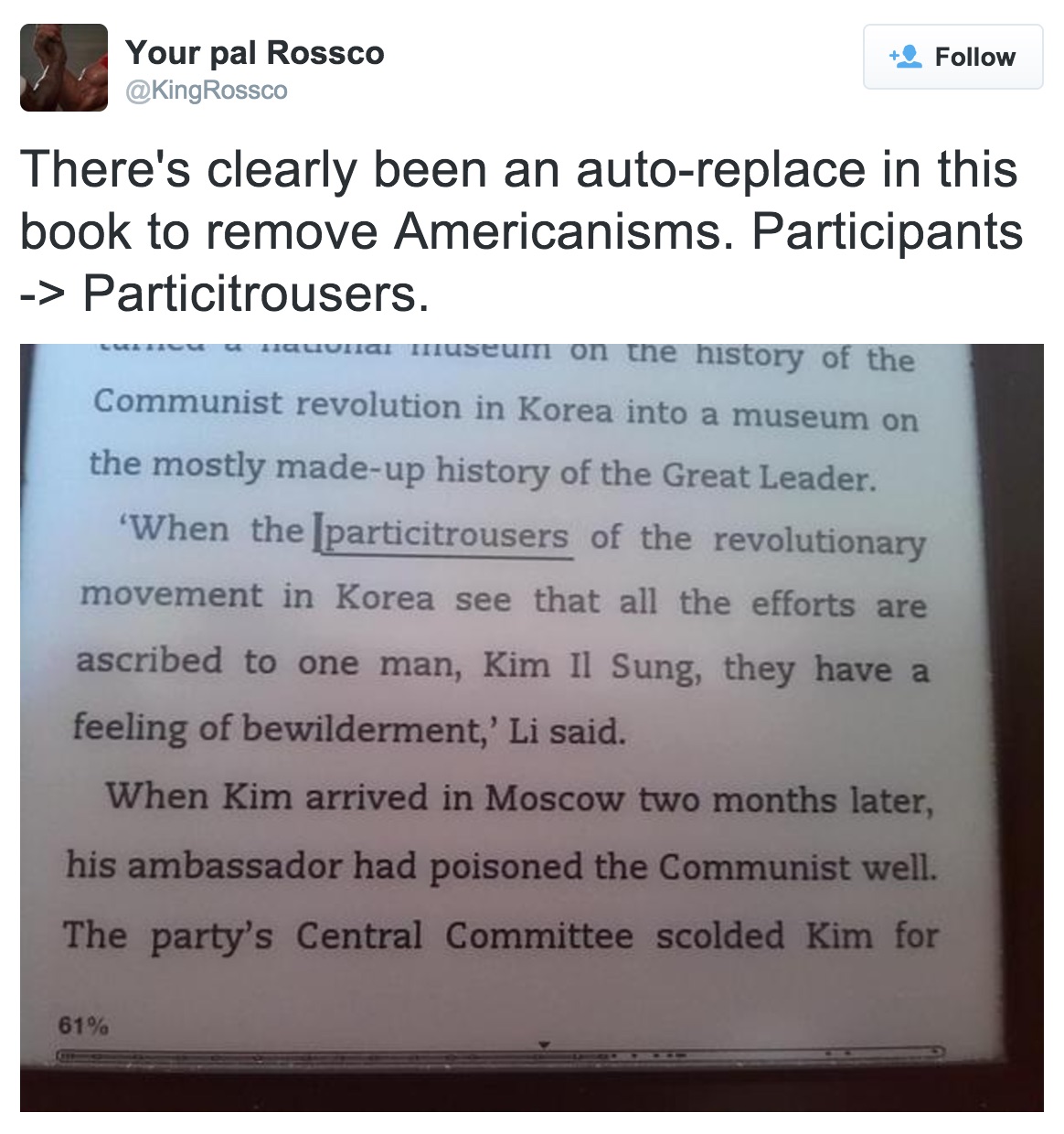Archive for Errors
September 8, 2015 @ 6:57 pm· Filed by Victor Mair under Errors, Language on the internets, Topolects, Transcription, Writing
Stephen Halsey, who is spending the year in Taiwan doing research, observed an interesting linguistic phenomenon that shows the predominance of sound over symbol, even in the writing of Chinese, where the symbols are complex and semantically "heavy" in comparison to phonetic scripts like the Roman alphabet or bopomofo / zhuyin fuhao (Mandarin phonetic symbols), where the symbols are simple and semantically "light".
Read the rest of this entry »
Permalink
September 7, 2015 @ 9:33 am· Filed by Ben Zimmer under Errors, Language and technology
Making the rounds on Twitter is this discovery by @KingRossco, from the UK Kindle edition of The Great Leader and the Fighter Pilot by Blaine Harden:

Read the rest of this entry »
Permalink
August 15, 2015 @ 10:37 am· Filed by Victor Mair under Alphabets, Errors, Transcription, Typography
Eric Pelzl sent in this photograph of a bag from a lunch delivery that contains an interesting printing error:

Read the rest of this entry »
Permalink
July 31, 2015 @ 1:16 am· Filed by Victor Mair under Errors, Writing, Writing systems
From Matthew Duggan:
As a Tokyo resident, I take an interest in the failing ability of those in China and Japan to write and distinguish characters due to computer use. [VHM: See, inter alia, here, here, here, here, and here.]
I could write 1,000 characters at my peak, but with constant computer use I’m down to my address and a few other common ones.
In that spirit, I thought you might like this news story.
The story Matthew linked to is in Japanese, but it features these two (perhaps not so) revealing photographs:

Read the rest of this entry »
Permalink
July 16, 2015 @ 1:37 am· Filed by Victor Mair under Eggcorns, Errors, Puns
Headline from the China Daily:
"China reigns in brutal police tactics" (9/9/03)
This hilarious misspelling causes China's widest circulating English-language newspaper accidentally to have a true headline.
Read the rest of this entry »
Permalink
March 3, 2015 @ 8:43 am· Filed by Geoffrey K. Pullum under Awesomeness, Changing times, Errors, Language and computers, Language and sports, Language and technology, Orthography, Silliness, Spelling
I think I know how an unsuitable but immensely rich desert peninsula got chosen by FIFA (the international governing body for major soccer tournaments) to host the soccer World Cup in 2022.
First, a personal anecdote that triggered my hypothesis about the decision. I recently sent a text message from my smartphone and then carelessly slipped it into my pocket without making sure it had gone to sleep.
Read the rest of this entry »
Permalink
January 27, 2015 @ 3:58 pm· Filed by Geoffrey K. Pullum under agreement, Dialects, Errors, Syntax
Outside a pub near my office in Edinburgh on the day of an important soccer fixture between Germany and Scotland there was a sign saying: "Free pint if Scotland win!"
Those with an eye for syntax will focus like a laser beam on the last letter of the last word. Should that have been "if Scotland wins"?
Read the rest of this entry »
Permalink
January 26, 2015 @ 9:30 am· Filed by Geoffrey K. Pullum under Errors, Information technology, Language and technology, Punctuation, Writing
Phishers trawling for email account names are generally smart enough to pull all sorts of programming tricks, forging headers and obtaining lists of spammable addresses and setting up arrangements to capture login names and passwords obediently typed in by the gullible; but then they give themselves away with errors of grammar and punctuation that are just too gross to be perpetrated by the authorized guys at the communications and technology services unit.
I received a phishing spam today that had no To-line at all (none of that "undisclosed recipients" stuff, and no mention of my email address in it anywhere). It looked sort of convincing in its announcement that webmail account holders would have to take certain steps to ensure the preservation of their address books after being "upgraded to a new enhanced Outlook interface". (My own university has, tragically, been induced to do an upgrade of this kind to its employee email services.) But the linguistic errors in the message begin with the 13th character in the From line (that second comma is wrong). I reproduce below the raw text of what I received, stripping out only the locally generated receipt and spam-checking headers (and by the way, this message—spam though it is—succeeded in getting a spam score of 0).
Read the rest of this entry »
Permalink
January 24, 2015 @ 3:58 pm· Filed by Geoffrey K. Pullum under adjectives, Errors, Grammar, Prescriptivist poppycock, Syntax
An email correspondent working for someone who is (evidently) a clueless would-be grammar purist appealed to me recently for help:
I am working with a client who insists that it is grammatically incorrect to use Get There First as a tag line. For the life of us, we cannot figure out what is grammatically incorrect about this phrase. Can you shed any light on our mystery?
Of course I can! Here at Language Log we solve half a dozen grammar mysteries of this sort before breakfast. I can not only finger the client's reaction as classic nervous cluelessness; I think I can identify the etiology of the mistake.
Read the rest of this entry »
Permalink
November 20, 2014 @ 7:21 am· Filed by Geoffrey K. Pullum under Dialects, Endangered languages, Errors, Grammar, Style and register
Bob Ladd points out that a commenter ("RobbieLePop") on a Guardian article about Prince Charles (the opinionated prince who is destined to inherit the throne under Britain's hereditary monarchical and theocratic system of government) said this:
The moment the Monarchy, with he at its head, begins a campaign of public influence is the moment the Monarchy should be disbanded.
With he at its head ? Let's face it, the traditionally accepted rules for case-marking pronouns in English are simply a mystery to many speakers.
Read the rest of this entry »
Permalink
October 18, 2014 @ 9:30 am· Filed by Victor Mair under Errors, Language and food, Writing
A few nights ago I delivered the Watt lecture before an audience of over two hundred people at UBC. More than half the people in the audience were native speakers of Mandarin or another Chinese language, and everybody else present was familiar with at least one East Asian language.
When I showed the famous jiaozi ingredients shopping list from John DeFrancis's article on "The Prospects for Chinese Writing Reform" (exhibit 2), the entire audience audibly gasped, and some people almost fell out of their seats. I really didn't have to say anything to make my point about character amnesia, which was one of the main topics of my lecture, but I did elaborate on the connection between IT and writing by hand, etc., plus the fact that the person who wrote that list was a Chinese Academy of Social Sciences researcher with a Ph.D.
Read the rest of this entry »
Permalink
October 17, 2014 @ 2:08 pm· Filed by Victor Mair under Errors, Language and advertising, Syntax
Bruce Rusk shared with me this photograph from a store in Vancouver’s Chinatown:

Read the rest of this entry »
Permalink
September 2, 2014 @ 2:38 pm· Filed by Geoffrey K. Pullum under Errors, Psychology of language, Spelling
I have commented before on the psycholinguistics of signs painted on roads: in the USA it is apparently assumed that drivers will read the words in the order in which their front wheels reach them, so that what appears to be a display with "ONLY" above "LANE" above "BIKE" is supposed to be read as "BIKE LANE ONLY".  In the UK, the opposite assumption is made: that drivers will read the whole display as a text that starts at the top. However, in one startling recent case in Bristol, south-west England, the people who painted the sign on the road warning of a bus stop never read it at all, in either order. They just stencilled "BUP STOP" on the roadway and packed up and left. Photographic evidence supplied herewith, just in case you cannot believe anyone capable of holding down a local government job could be unable to spell "BUS".
In the UK, the opposite assumption is made: that drivers will read the whole display as a text that starts at the top. However, in one startling recent case in Bristol, south-west England, the people who painted the sign on the road warning of a bus stop never read it at all, in either order. They just stencilled "BUP STOP" on the roadway and packed up and left. Photographic evidence supplied herewith, just in case you cannot believe anyone capable of holding down a local government job could be unable to spell "BUS".
Permalink




 In the UK, the opposite assumption is made: that drivers will read the whole display as a text that starts at the top. However, in one startling recent case in Bristol, south-west England, the people who painted the sign on the road warning of a bus stop never read it at all, in either order. They just stencilled "BUP STOP" on the roadway and packed up and left. Photographic evidence supplied herewith, just in case you cannot believe anyone capable of holding down a local government job could be unable to spell "BUS".
In the UK, the opposite assumption is made: that drivers will read the whole display as a text that starts at the top. However, in one startling recent case in Bristol, south-west England, the people who painted the sign on the road warning of a bus stop never read it at all, in either order. They just stencilled "BUP STOP" on the roadway and packed up and left. Photographic evidence supplied herewith, just in case you cannot believe anyone capable of holding down a local government job could be unable to spell "BUS".